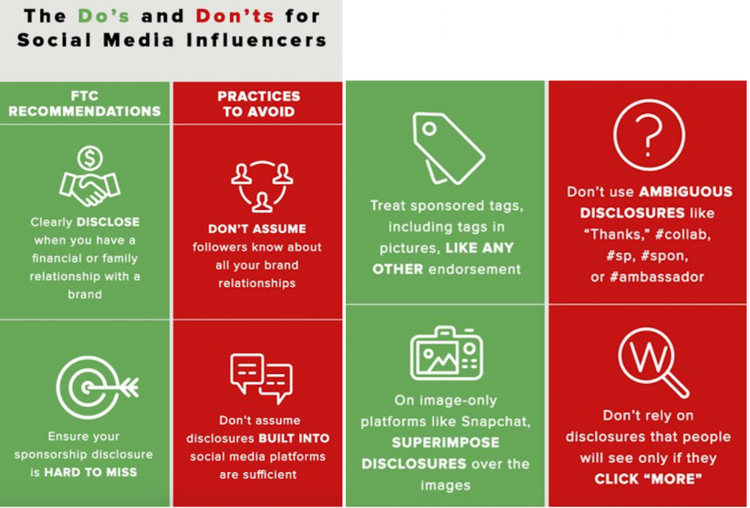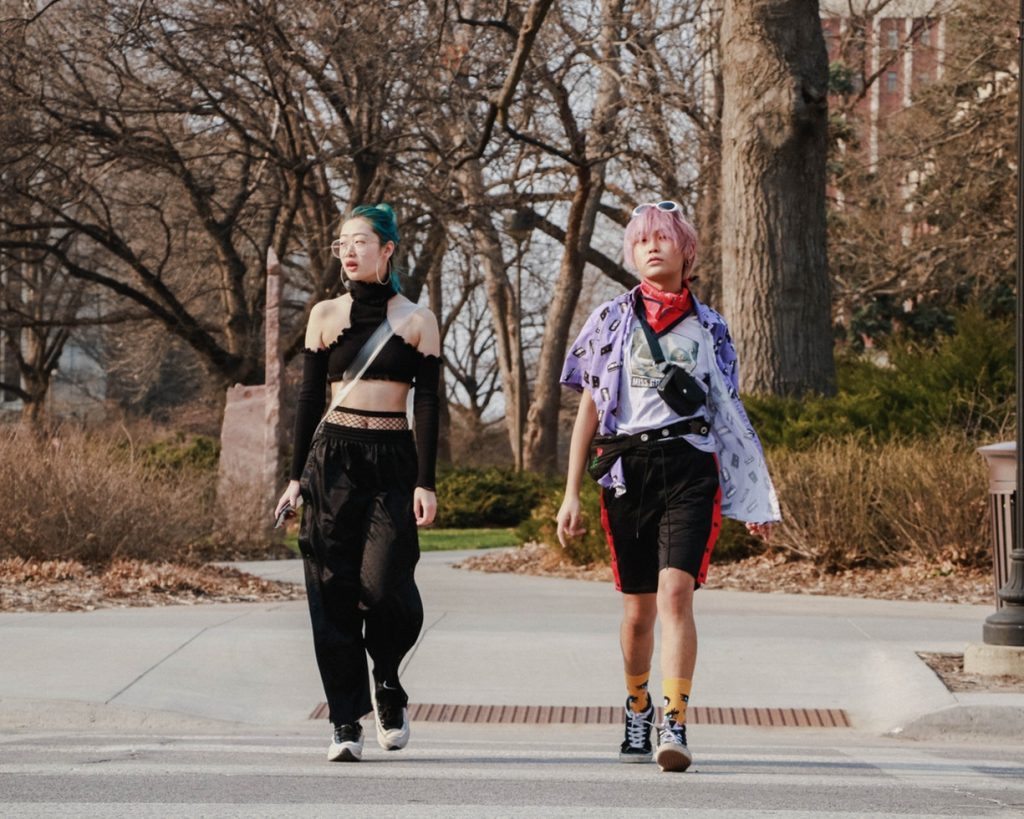Earlier this month, the Federal Trade Commission settled a formal investigation that it commenced against two YouTube influencers. It also took the opportunity to send a new batch of letters to social media stars and celebrities, and issue additional guidelines regarding disclosures. On the heels of such increased actions involving social media influencers, the FTC held an influencer-specific session on Twitter on Wednesday to answer questions pertaining to how brands and influencers can ensure that they are abiding by U.S. laws.
The questions and the FTC’s answers – including guidance on whether Instagram’s new “paid partnership” feature is a valid disclosure (hint: it’s probably not) – are as follows. Some of the particularly relevant ones (in my opinion) are italicized …
Q1: I’ve seen a lot of influencer guidance in blogs on this. What are FTC’s official tips for influencers?
Check out the do’s and don’ts for social media influencers (directly below)

Q2: Do I need to list the details of everything I get from a company for reviewing a product?
No. If you got $100 or $10,000 you could just say you were “paid.” But, that wouldn’t be good enough, however, if you’re an employee or co-owner.
Q3: As an #influencer, I often use #ad to disclose brand affiliation, is that sufficient?
For Twitter #ad is sufficient as long as it’s easily noticed. But if #ad is mixed in with links, handles or other hashtags, readers may naturally just skip over all that clutter. With multiple links & hashtags, #ad may go unnoticed, best to make it visible in the beginning whenever possible.
Q4: How can I make a disclosure on Snapchat or in Instagram Stories?
You can superimpose a disclosure over images on those platforms. It should be easy to notice & read in the time that your followers have to look at the images.
Q5: I’m an influencer. Whenever I mention/tag a product, do I have to say whether I got it for free or paid for it myself?
No. If you mention a product you paid for yourself or just happen to like, there isn’t an issue. The FTC is only concerned about endorsements made on behalf of a sponsoring advertiser. If an advertiser or someone working for an advertiser pays you or gives you something of value to mention a product.
Q6: What if I work for a brand but wasn’t paid for a specific post?
You should still disclose your connection to the brand.
Q7: I’m well-known as a spokesperson for a product. Do I have to disclose I’m being paid each time I tweet about it?
If your followers know that you’re paid to endorse that product, no disclosure is needed, but if a significant portion of your followers don’t know that, the relationship should be disclosed. Determining whether followers are aware of a relationship could be tricky in many cases, so we recommend disclosure.
To clarify, followers must know they are sponsored by that specific brand.
Q8: If a U.S. influencer travels abroad for a U.S. brand, which laws do influencer’s posts need to follow – U.S., abroad or both?
U.S. law applies when it’s reasonably foreseeable that posts will affect U.S. consumers, which it would be. Foreign law might also apply.
Q9: In a series of short, disappearing posts like Snap or IG stories is disclosure necessary on all posts or just the 1st?
When all photos will be seen, disclosure on first one could be good enough if it stands out & viewers have time to notice it.
Q10: If an influencer is gifted tickets to an event, can they post personal [point of view] content w/o brand msg or is disclosure required?
If the [point of view] relates to the brand/sponsor, make the disclosure. If not related to the brand, no disclosure is necessary.
Q11: How does the FTC view non-U.S. influencers with a significant number of American followers?
U.S. law applies when it’s reasonably foreseeable that posts will affect U.S. consumers. So, if posting about products sold in U.S., they should disclose.
Q12: Regarding influencer-hosted giveaways funded by [third parties]: Are there disclosure requirements or other considerations to be mindful of?
Followers should be told that the giveaway is sponsored by 3rd party. They shouldn’t think influencer is funding the giveaway or that influencer isn’t getting anything for her/himself.
Q13: Can an image be used for disclosure rather than text as long as it appears before links/ads?
Yes, if it stands out, followers can’t avoid it, and they understand it.
Q14: How can we get FTC to certify our standards if the affiliate marketing industry self-regulates?
There’s no process for “certification” but staff is happy to give informal guidance.
Q15: Can you discuss the updated guidance on Facebook “likes” and under what circumstances disclosure is required?
Before taking any action, we’d have to answer whether simple likes are material.
Q16: Regarding built-in disclosures: Is the “includes paid promotion” mark on [YouTube] videos insufficient? The “Paid” tag on Facebook?
Don’t assume that disclosures built into platforms are sufficient. It depends on whether the tool clearly and conspicuously discloses the connection. FTC staff doesn’t think that the built-in YouTube and FB tools suffice. The same applies to the built-in Instagram tool.
Q17: Can I affiliate promote something where I am displayed as a testimonial?
As long as there is transparency/disclosure everywhere, there isn’t any issue.
Q18: Affiliate and influencer marketing can overlap. At what point would the FTC look at an affiliate as an influencer?
We advise disclosing affiliate relationships, like a review with an affiliate link. When an individual is posting content as an affiliate, he/she is usually an influencer. There are anonymous web sites set up by affiliates – then the affiliate is more like the advertiser.
Q19: If an employee brand ambassador using the corporate social media account ads #ambassador to the post is that an appropriate disclosure?
#ambassador is an ambiguous disclosure, not good enough. Not sure why a post from official corporate account needs any disclosure.
Q20: If I post an affiliate link to a webpage that has nothing for sale YET, do I have to disclose affiliate relationship?
Yes, if something will be for sale later.
Q21: A company sends something for free. No demand to post & no pay. If you post [because] you like it & use it, is that an #ad?
Yes, it is an ad – if they send it to you because you’re an influencer or for you to review it.
Q21-a: Advice for disclosing on Pinterest?
A superimposed disclosure or one in the description could work. It needs to be clear and conspicuous.
Q22: Do I need to disclose on my Facebook ad that my blog post has affiliate links? Or is disclosure on the blog enough?
The blog itself is probably good enough.
Q23: Is #ad the preferred disclosure to follow @FTC guidelines & regulations?
Using #ad is great IF it’s placed where it’s hard to miss.
Q24: If an influencer doesn’t heed a brand’s written advice regarding disclosure, how is FTC likely to react to the brand?
Brand should also monitor & follow up. But if an influencer doesn’t listen & is dismissed, then that’s all [a] brand can do.
Q25: Can’t we just use the word ad without the hashtag?
Yes, but must be visible and hard to miss.
Q26: On options outside of #ad / #paid is there a definitive on whether # XX partner or similar suffices vs. “is stronger”?
Yes, hashtag XXPartner should be good enough when XX is brand name.











